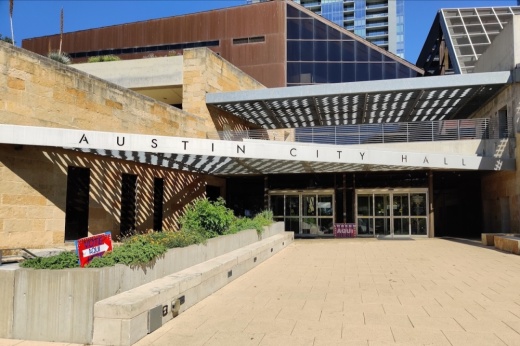The session will be followed by another regular meeting Nov. 3. After next week, council will meet for regular voting sessions once more in November followed by two weeks of back-to-back meetings Dec. 1-2 and 8-9.
Police protest payouts continue
City Council also signed off on a $1.75 million lawsuit settlement to a Travis County resident allegedly injured by Austin Police Department officers in an excessive force incident during the May 2020 protests downtown.
The payment will go to Jose "Joe" Herrera, a protester who said in a lawsuit that he was unarmed when an officer shot him with a "beanbag" shotgun round that left him disfigured and suffering from psychological distress in the wake of the demonstrations against police brutality.
The settlement council agreed to Oct. 27 was the eighth agreement made in relation to police officers' alleged injury of protestors in 2020 and brings the city's total tab for such payouts to $16.65 million this year. Settlements have ranged in size from a $100,000 total approved in May to $8 million approved in February and are funded through the city's liability reserve.
Balancing council priorities
The recurring topic of how city leaders' actions affect development and housing affordability came up during two council deliberations Oct. 27.
Leaders most recently faced off over the question of environment versus affordability during summer debates over Austin's parkland dedication requirements and to what level developers in the city should be asked to support Austin's green space needs. With a stated desire to avoid situations, such as those where officials appear to choose enhanced environmental protections at the expense of housing, or the reverse, Mayor Steve Adler proposed a policy that will see city staff recommend an "offset" to any new development requirements that would hurt capacity or affordability.
Adler's framework will also ask for a review of relevant policies approved in the past two years along with recommendations to balance any development effects.
Later in the session, officials looked at a similar issue during the passage of a separate revision to various environmental and landscaping development requirements.
The land development code update was the first of two in that subject area that council called for earlier this year. The ordinance approved Oct. 27 covers parking lot design, storm- and wastewater infrastructure and wetland protections.
A city staff review of the changes found they would have an "undetermined" effect on housing affordability, with environmental improvements offset against increased construction costs. Under the revised code, staff said market-rate housing prices would be expected to rise while income-restricted development could lose units and amenities.
Based on staff's review and the two-part consideration of the environmental rules, District 4 Council Member Chito Vela said he was worried council might pass the new provisions without fully scrutinizing the end results and brought several related amendments to the dais.
"Right now, what we’re going to do is we’re going to add additional costs, and we’re going to mitigate that sometime down the road, undefined and unclear," he said. "Affordability is the single most important thing that we confront, and I don’t want to kick the can down the road on affordability."
Vela's tweaks included flexible options for developers' stormwater facilities, creating a bonus for developers who exceed city water quality building standards and giving developers partial impervious cover credit when using porous pavement options. Most of those amendments were pushed to be considered by council during "Phase 2" of the requested development code revisions—likely after several sitting members' terms end.
“I like that ... because that means I don’t have to make a choice today between environmental protections and affordability, and I trust the next council to figure out the appropriate offsets and standards," Adler said.
One Vela amendment, creating a variance from green stormwater infrastructure requirements if such construction limits a site's development, will activate next November. Vela said that lag will either let council reconsider the issue or result in his proposal going into effect.
"That way, we have incentive to get it done," he said.
Multilingual emergency support
Following council's dive into the "crisis" in the city's 911 call center Oct. 25, a request from District 6 Council Member Mackenzie Kelly could see emergency communications in the city become more friendly to the nearly 30% of Austinites who do not speak English at home.
Kelly's resolution will have the city seek out a text-to-911 translation service, and also calls on state and federal leaders to adopt a national text-to-911 standard.
“In Austin, if a text message comes into our 911 call center, call-takers oftentimes have to translate the information they receive manually. And as you’re aware, in an emergency, every second counts," Kelly said.





